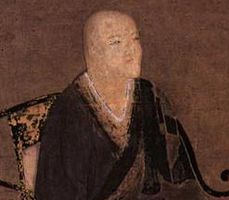Dōgen: Difference between revisions
No edit summary |
No edit summary |
||
| (5 intermediate revisions by the same user not shown) | |||
| Line 1: | Line 1: | ||
{{Person | {{Person | ||
|HasDrlPage=Yes | |HasDrlPage=Yes | ||
|HasLibPage=Yes | |HasLibPage=Yes | ||
|HasBnwPage=Yes | |HasBnwPage=Yes | ||
|pagename=Dōgen | |||
|PersonType=Authors of Japanese Works | |||
|images=File:Dogen Wikipedia.jpeg | |||
|MainNamePhon=Dōgen | |MainNamePhon=Dōgen | ||
|namefirst=Dōgen | |namefirst=Dōgen | ||
|AltNamesOther=Dōgen Kigen; Dōgen Zenji | |AltNamesOther=Dōgen Kigen (道元希玄); Dōgen Zenji (道元禅師); Eihei Dōgen (永平道元); Kōso Jōyō Daishi (高祖承陽大師); Busshō Dentō Kokushi (仏性伝東国師) | ||
|yearbirth=1200/01/19 | |yearbirth=1200/01/19 | ||
|yeardeath=1253/09/22 | |yeardeath=1253/09/22 | ||
|bio=Dōgen Zenji (道元禅師; 19 January | |bio=Dōgen Zenji (道元禅師; 19 January 1200– 22 September 1253), also known as Dōgen Kigen (道元希玄), Eihei Dōgen (永平道元), Kōso Jōyō Daishi (高祖承陽大師), or Busshō Dentō Kokushi (仏性伝東国師), was a Japanese Buddhist priest, writer, poet, philosopher, and founder of the Sōtō school of Zen in Japan. | ||
Originally ordained as a monk in the Tendai School in Kyoto, he was ultimately dissatisfied with its teaching and traveled to China to seek out what he believed to be a more authentic Buddhism. He remained there for five years, finally training under Tiantong Rujing, an eminent teacher of the Chinese Caodong lineage. Upon his return to Japan, he began promoting the practice of zazen (sitting meditation) through literary works such as Fukan zazengi and Bendōwa. | Originally ordained as a monk in the Tendai School in Kyoto, he was ultimately dissatisfied with its teaching and traveled to China to seek out what he believed to be a more authentic Buddhism. He remained there for five years, finally training under Tiantong Rujing, an eminent teacher of the Chinese Caodong lineage. Upon his return to Japan, he began promoting the practice of zazen (sitting meditation) through literary works such as ''Fukan zazengi'' and ''Bendōwa''. | ||
He eventually broke relations completely with the powerful Tendai School, and, after several years of likely friction between himself and the establishment, left Kyoto for the mountainous countryside where he founded the monastery Eihei-ji, which remains the head temple of the Sōtō school today. | He eventually broke relations completely with the powerful Tendai School, and, after several years of likely friction between himself and the establishment, left Kyoto for the mountainous countryside where he founded the monastery Eihei-ji, which remains the head temple of the Sōtō school today. | ||
Dōgen is known for his extensive writing including his most famous work, the collection of 95 essays called the Shōbōgenzō, but also Eihei Kōroku, a collection of his talks, poetry, and commentaries, and Eihei Shingi, the first Zen monastic code written in Japan, among others. | Dōgen is known for his extensive writing including his most famous work, the collection of 95 essays called the ''[[Shōbōgenzō]]'', but also ''Eihei Kōroku'', a collection of his talks, poetry, and commentaries, and ''Eihei Shingi'', the first Zen monastic code written in Japan, among others. ([https://en.wikipedia.org/wiki/D%C5%8Dgen Source Accessed Jan 9, 2020]) | ||
|ReligiousAffiliation=Sōtō school | |||
|IsInGyatsa=No | |IsInGyatsa=No | ||
|classification=People | |classification=People | ||
Revision as of 14:51, 26 October 2020
| PersonType | Category:Authors of Japanese Works |
|---|---|
| FirstName / namefirst | Dōgen |
| MainNamePhon | Dōgen |
| AltNamesOther | Dōgen Kigen (道元希玄) · Dōgen Zenji (道元禅師) · Eihei Dōgen (永平道元) · Kōso Jōyō Daishi (高祖承陽大師) · Busshō Dentō Kokushi (仏性伝東国師) |
| bio | Dōgen Zenji (道元禅師; 19 January 1200– 22 September 1253), also known as Dōgen Kigen (道元希玄), Eihei Dōgen (永平道元), Kōso Jōyō Daishi (高祖承陽大師), or Busshō Dentō Kokushi (仏性伝東国師), was a Japanese Buddhist priest, writer, poet, philosopher, and founder of the Sōtō school of Zen in Japan.
Originally ordained as a monk in the Tendai School in Kyoto, he was ultimately dissatisfied with its teaching and traveled to China to seek out what he believed to be a more authentic Buddhism. He remained there for five years, finally training under Tiantong Rujing, an eminent teacher of the Chinese Caodong lineage. Upon his return to Japan, he began promoting the practice of zazen (sitting meditation) through literary works such as Fukan zazengi and Bendōwa. He eventually broke relations completely with the powerful Tendai School, and, after several years of likely friction between himself and the establishment, left Kyoto for the mountainous countryside where he founded the monastery Eihei-ji, which remains the head temple of the Sōtō school today. Dōgen is known for his extensive writing including his most famous work, the collection of 95 essays called the Shōbōgenzō, but also Eihei Kōroku, a collection of his talks, poetry, and commentaries, and Eihei Shingi, the first Zen monastic code written in Japan, among others. (Source Accessed Jan 9, 2020) |
| YearBirth | 1200/01/19 |
| YearDeath | 1253/09/22 |
| ReligiousAffiliation | Sōtō school |
| IsInGyatsa | No |
| Other wikis |
Full Name
Dōgen
Affiliation
Sōtō school
Biographical Data
Dōgen Zenji (道元禅師; also Dōgen Kigen 道元希玄, or Eihei Dōgen 永平道元, or Koso Joyo Daishi) (19 January 1200 – 22 September 1253) was a Japanese Zen Buddhist teacher born in Kyōto, and the founder of the Sōtō school of Zen in Japan. He was a leading religious figure of his time, as well as being an important philosopher. Dōgen is most known for the Treasury of the Eye of the True Dharma or Shōbōgenzō, a collection of ninety-five fascicles concerning Buddhist practice and enlightenment.
